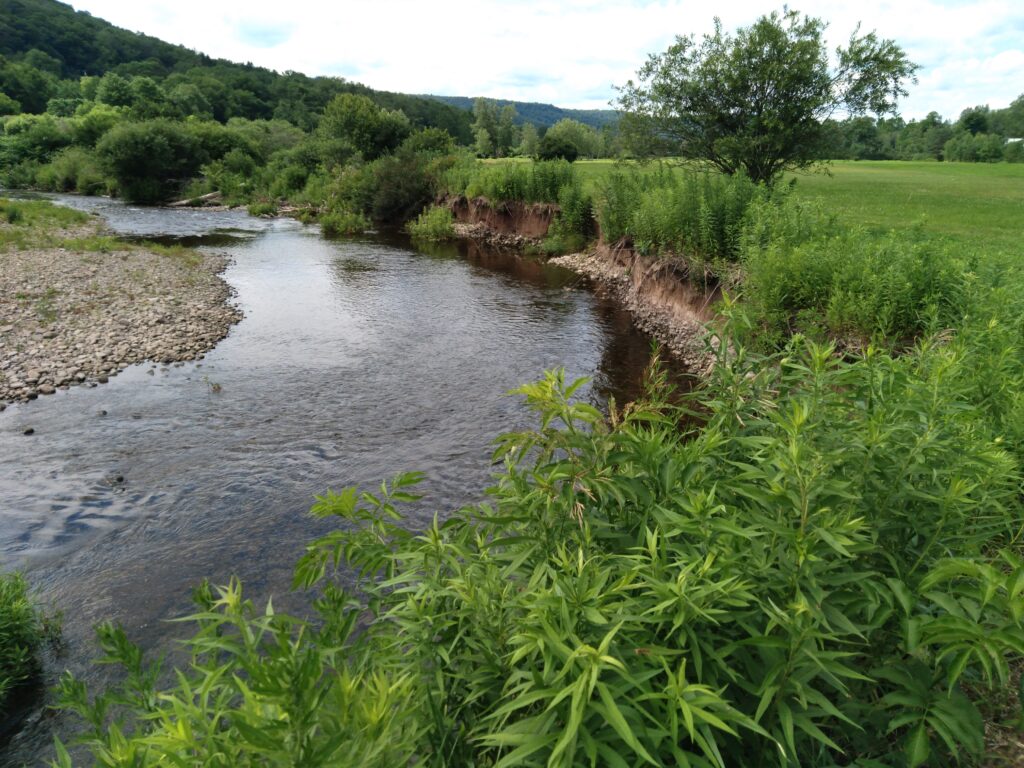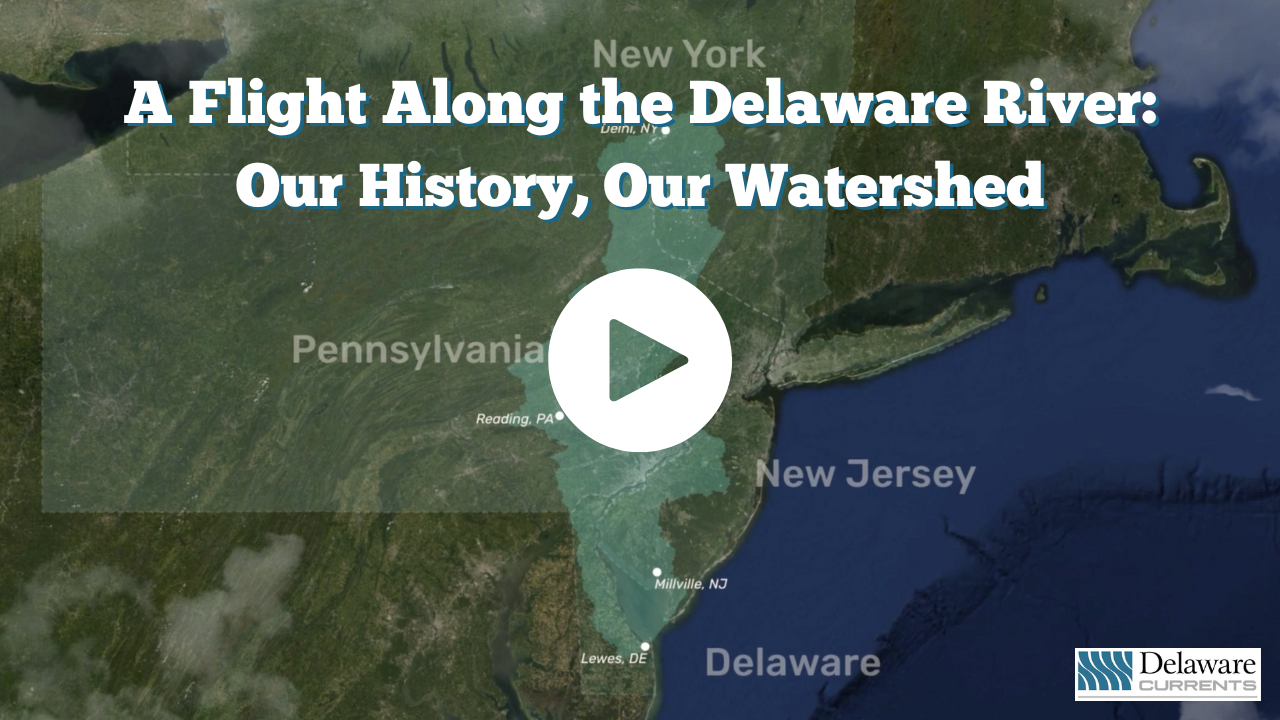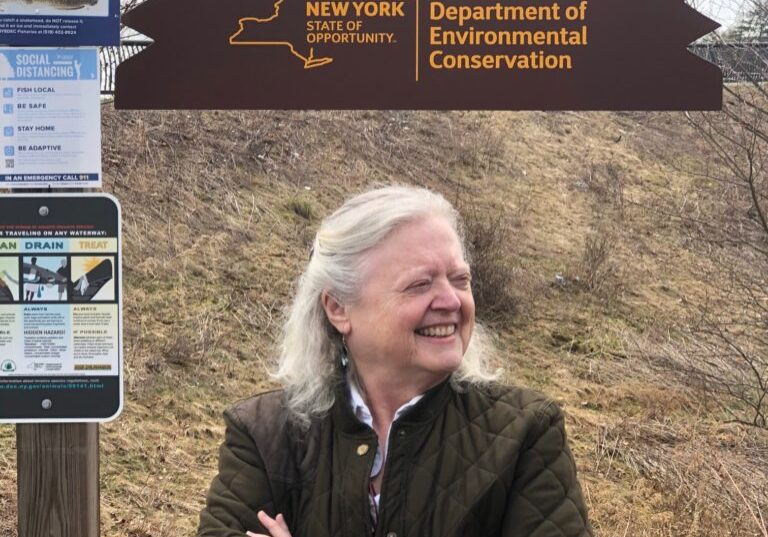
Teamwork saves a stream in the Upper Delaware – and more
| June 23, 2022
There were several “stars” of the show on the banks of the Little Beaver Kill in Livingston Manor, N.Y., on June 17.
One is the stream itself, famous for its trout fishing. The other is the teamwork that brought $300,000 into Upper Delaware for use as matching funds to benefit fish, of course, but importantly to ensure that local communities have good quality water. More here.
And that teamwork is not just sprayed on for a news conference but has been developed over several years by the Friends of Upper Delaware, Trout Unlimited, and local municipalities in Delaware and Sullivan Counties. More here.
The spark for that work was the passage by Congress of the Delaware River Basin Conservation Act, which made millions of dollars available for on-the-ground conservation work, funneled through the National Fish and Wildlife Foundation. More here.
Jennifer Grossman, the landowner of this section of the stream, applauded the work done but emphasized, “Stewardship is not just about this place, but about the region: Think globally, act locally.”
The project brought up-to-date know-how to “rescue” a stream that flooded, as many streams do in this part of the world. It was designed by Trout Unlimited and the U.S. Fish and Wildlife Service. All of the construction work was done by Rick Barnhart of local business Barnhart Services.
Once upon a time, the homegrown solution to the flooding that plagues the water-rich Upper Delaware was to get in the river with earth-movers and dig it out.
As Art Merrill, supervisor of the Town of Colchester in Delaware County, N.Y., explained back in 2019 here: “We’ve had a change of heart in the municipal understanding of how to deal with water. No longer getting into the stream: big boys with big toys. Now we have a plan.”
Now the common consensus is that you really do have to go with the flow: Find where the water wants to go and ease it along. When you widen flood plains and create natural water-friendly banks, the water will ebb and flow without too much damage to river banks, and that means less sediment in the water to clean up and will also keep native species happy — which might also have the benefit of discouraging invasive species.


As Carl Schwartz of the U.S. Fish and Wildlife Service explained about this project and others like it: “We want to do good climate-resilience work that benefits the fish and the community. There’s a lot of effort to make it look like we haven’t been here.”
Grossman introduced another star, New York State Assemblywoman Aileen Gunther, a Democrat who represents most of Sullivan County as well as Middletown in Orange County. Grossman said of her, “I can’t think of a better environmental champion.”
Gunther praised the combined efforts of all the people and organizations that made that $300,000 line item in the Environmental Protection Fund happen. More here. “You’re relentless,” Gunther said of the team that made the funding happen.
She also praised her colleague, New York State Senator Mike Martucci, a Republican who represents parts of Sullivan and Orange Counties, who couldn’t be at the gathering but whose help made sure it was a bipartisan effort to bring the money home. Both legislators fulfilled a promise to get that $300,000 for the upper river into the state budget. More here.
“That’s my job,” said Gunther. “I bring taxpayer dollars to this community.”
Which might have been a cue for Andy Boyar, chairman of the Upper Delaware Council, to hammer home the need for New York State to live up to its unfulfilled promise of funding for the UDC. More here.
“We’ve been trying since 1988, but we haven’t lost hope,” Boyar said. He asked for support and for Gunther to “be our champion — be our water carrier.”
At the same time, as the president of the Upper Delaware chapter of Trout Unlimited, he was “joyful” at the progress that’s been made to do work on streams that benefit year-round residents and the 270,000 visitors to the national park, the Upper Delaware Scenic and Recreational River.
Though Julie Tighe, president of the New York League of Conservation Voters, is now based in New York City, her roots are in the Upper Delaware. She praised the full-court press from all the local organizations. “If you know Albany, you know you’ve got to have firepower,” she said.
Her goal now is ensuring that the line item not only stays permanently in the Environmental Defense Fund but is increased.
There were a lot of speakers but then, there were a lot of shoulders at the wheel, including: Vinny Sapienza, commissioner of New York City’s Department of Environmental Protection; Freda Eisenberg, representing Sullivan County’s Planning Department; and Jennifer Orr-Greene, Eastern policy director for Trout Unlimited.
And one more to bring us full circle: Kelly Knutson, executive director of the Coalition for the Delaware River Watershed, which has been working to funnel federal dollars into the watershed, largely though the Delaware River Basin Restoration Program. More here.
The money from New York will provide needed matching funds for projects in New York and Knutson said the coalition will be working with his environmental partners to ask for similar commitments from the other three watershed states, New Jersey, Pennsylvania and Delaware.
Let’s let the closing words come from Orr-Greene from Trout Unlimited: “We, and the fish, thank you!”


![DC_Image [Image 4_Assunpink Meets Delaware] meets Delaware The Assunpink Creek on its its way to meet the Delaware River. The creek passes through woods, industrial and commercial areas and spots both sparkling and filled with litter.](https://delawarecurrents.org/wp-content/uploads/bb-plugin/cache/DC_Image-4_Assunpink-meets-Delaware-1024x768-landscape-14f069364113da5e8c145e04c9f2367c-.jpg)




Wow, such a great story Meg, thanks for being there and spreading the word of all the great work these organizations and elected officials are doing. So much has happened in the last 20 years in the Upper Delaware River watershed, we have so much to be thankful for, and so much more to look forward to with these great stewards of the river on the job.
All the best!